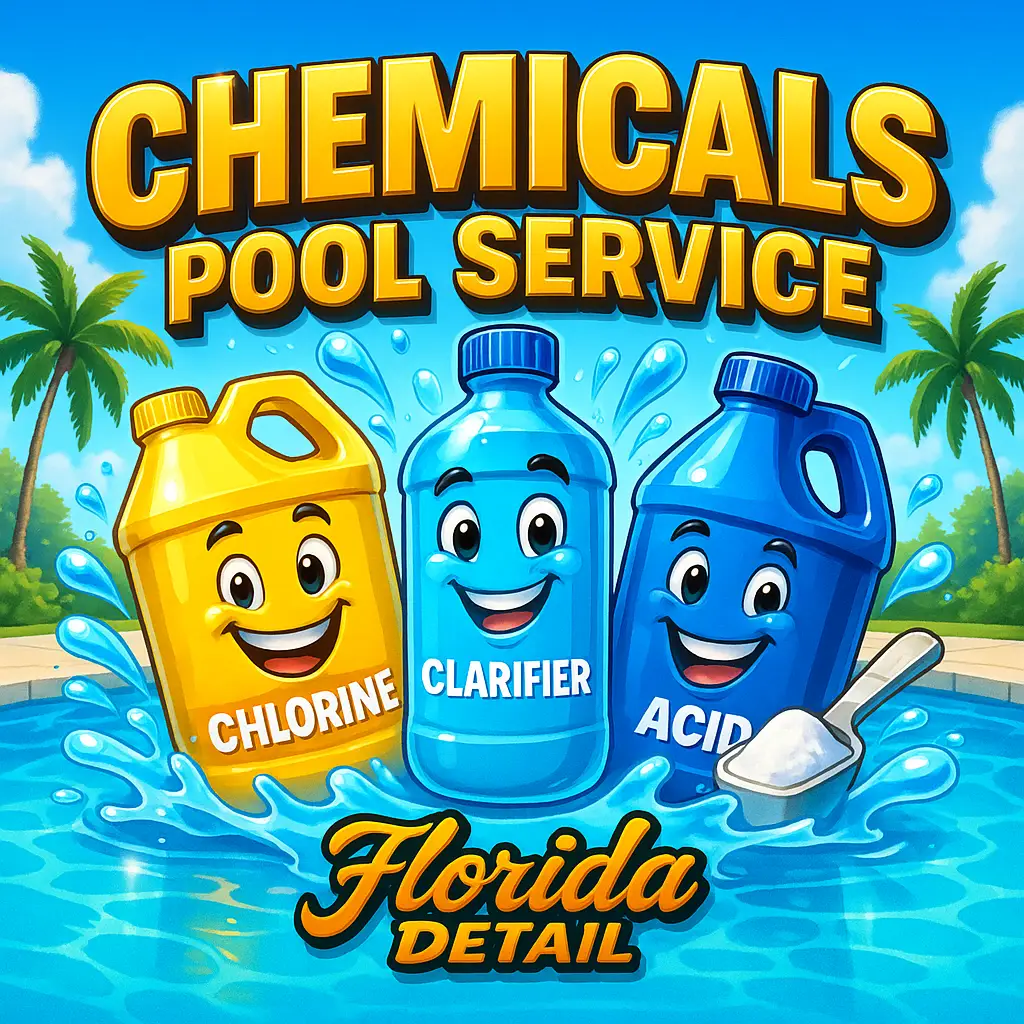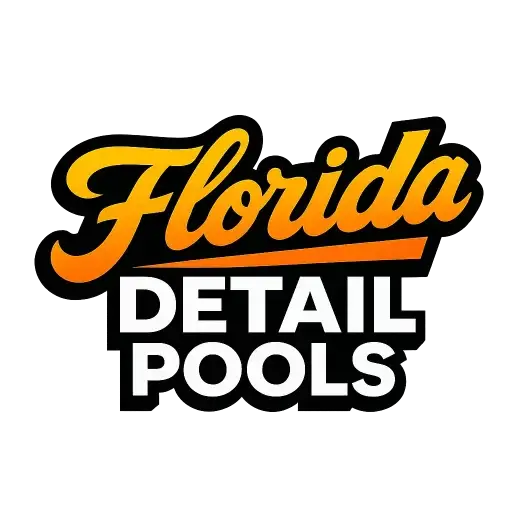Pool Filter Troubleshooting Guide for Charlotte County: Expert Solutions for Common Problems
Pool ownership in Charlotte County brings year-round swimming enjoyment, but maintaining crystal-clear water requires a properly functioning filtration system. Your pool’s filter represents the heart of water quality management, working continuously to remove contaminants, debris, and microscopic particles that would otherwise create unsafe swimming conditions and unsightly water clarity issues.
Despite their critical importance, pool filters are often the most misunderstood and neglected components of pool systems. Many Charlotte County homeowners don’t realize that most water quality problems, equipment strain, and expensive repairs can be traced back to filter-related issues that could have been prevented with proper understanding and maintenance.
At Florida Detail, we’ve diagnosed and resolved thousands of filter problems throughout Charlotte County, Port Charlotte, Punta Gorda, and North Port. The patterns are remarkably consistent: most filter issues develop gradually and provide clear warning signs before becoming serious problems. Understanding these warning signs and knowing how to respond can save thousands of dollars in equipment replacement while ensuring consistently safe, clean swimming water.
Understanding Filter Function in Charlotte County’s Climate
Charlotte County’s unique environmental conditions create specific challenges for pool filtration systems that differ significantly from those in other regions:
High Debris Loads: Frequent storms, abundant vegetation, and year-round plant growth create constant debris challenges that can overwhelm inadequately maintained filter systems.
Intense UV Exposure: Strong sunlight accelerates chemical breakdown and increases bather comfort needs, requiring more efficient filtration to maintain water quality.
Extended Operating Seasons: Year-round pool use means filters never get rest periods, accelerating wear and requiring more frequent maintenance than pools in seasonal climates.
Water Chemistry Fluctuations: Frequent rain, high evaporation rates, and temperature variations stress filter systems through constantly changing water chemistry conditions.
Organic Contamination: High humidity and warm temperatures create ideal conditions for algae and bacteria growth, increasing filtration demands significantly.
Understanding these regional factors helps explain why standard maintenance approaches often prove inadequate in Southwest Florida and why professional expertise becomes essential for optimal system performance.
1. Diagnose and Resolve Low Water Flow Issues
Reduced water circulation represents one of the most common and serious filter-related problems affecting Charlotte County pools. Poor flow compromises filtration efficiency while creating conditions that promote algae growth and chemical imbalance.
Comprehensive Flow Problem Diagnosis:
Skimmer and Basket Inspection: Clogged skimmer baskets and pump strainer baskets represent the most common cause of flow reduction. Daily inspection and cleaning prevent most flow-related problems while protecting equipment from damage.
Filter Media Evaluation: Different filter types require specific maintenance approaches. Cartridge filters need regular rinsing and periodic replacement, sand filters require backwashing and eventual media replacement, while DE filters need recharging and grid inspection.
Suction-Side Leak Detection: Air leaks in suction lines cause flow reduction and can damage pump components through cavitation. Common leak points include pump lid O-rings, union connections, and underground plumbing joints.
Water Level Monitoring: Insufficient water levels prevent proper skimmer operation and can cause air entrainment that reduces circulation effectiveness. Maintaining proper water levels ensures optimal system performance.
Advanced Diagnostics: Our equipment diagnostic services use professional testing equipment to measure actual flow rates and identify system inefficiencies that aren’t apparent through visual inspection alone.
Professional Solutions: When basic troubleshooting doesn’t resolve flow issues, underlying problems may require professional assessment. Underground leaks, pump impeller damage, or internal plumbing restrictions often need specialized equipment and expertise to diagnose accurately.
2. Address Filter Media Contamination and Replacement
Filter media degradation occurs gradually, making it difficult for pool owners to recognize when replacement becomes necessary. Understanding the signs of filter media failure helps maintain optimal water quality while preventing equipment damage.
Filter Type-Specific Maintenance:
Cartridge Filter Management: Cartridge filters trap contaminants in their fabric fibers and require regular cleaning to maintain effectiveness. Proper cleaning technique involves alternating between chemical cleaning and mechanical rinsing to remove both organic and mineral deposits.
Sand Filter Optimization: Sand filters use physical straining and biological action to remove contaminants. Backwashing frequency depends on bather load, environmental conditions, and water chemistry balance. Our filter maintenance services determine optimal backwashing schedules for your specific conditions.
DE Filter Excellence: Diatomaceous earth filters provide the finest filtration but require precise maintenance procedures. Grid inspection and DE powder quality significantly affect performance, while improper maintenance can damage expensive filter grids.
Performance Monitoring: Professional water testing reveals when filter media reaches capacity limits, even when visual signs aren’t apparent. Advanced testing identifies microscopic contamination that indicates filter replacement needs.
Replacement Scheduling: Proactive filter media replacement prevents performance degradation and equipment strain. Our preventive maintenance programs include filter replacement scheduling based on actual performance rather than arbitrary time intervals.
3. Eliminate Air Entrainment Problems
Air in pool circulation systems causes multiple problems including reduced filtration efficiency, equipment damage, and poor water quality. Charlotte County’s frequent weather changes can exacerbate air entrainment issues through pressure fluctuations and water level changes.
Air Problem Identification:
Visual Indicators: Bubbles in return jets, incomplete pump basket filling, and fluctuating pressure readings indicate air entrainment that requires immediate attention.
Equipment Damage Prevention: Air in circulation systems causes cavitation that damages pump impellers, seals, and motor bearings. Early detection prevents expensive equipment replacement.
System Priming Procedures: Proper system priming ensures complete air removal and optimal circulation. This process requires understanding specific equipment requirements and safety procedures.
Leak Detection Techniques: Identifying air leak sources requires systematic testing of all suction-side connections, seals, and fittings. Professional leak detection equipment can locate problems not visible during casual inspection.
Prevention Strategies: Maintaining proper water levels, ensuring tight connections, and regular seal replacement prevent most air entrainment problems. Our system maintenance programs include comprehensive air leak prevention protocols.

4. Resolve Equipment Noise and Vibration Issues
Unusual equipment noises indicate developing problems that require immediate attention to prevent expensive failures. Understanding different noise types helps identify specific problems and appropriate solutions.
Noise Diagnosis and Solutions:
Pump Motor Issues: Bearing wear, loose components, and electrical problems create distinctive noise patterns that trained technicians can identify. Early intervention prevents complete motor failure and expensive emergency replacements.
Cavitation Problems: Insufficient water flow causes cavitation that creates noise while damaging pump components. Addressing root flow issues prevents ongoing equipment damage.
Mechanical Loose Components: Vibration from loose mounting bolts, worn isolation pads, or misaligned components creates noise while potentially damaging surrounding equipment and structures.
Impeller Obstructions: Debris caught in pump impellers creates grinding noises and reduces circulation efficiency. Professional debris removal prevents impeller damage and restores optimal performance.
Professional Assessment: Our equipment inspection services use advanced diagnostic tools to identify noise sources and recommend appropriate corrective actions before problems become critical.
5. Combat Persistent Algae Growth
When algae continues growing despite apparent filtration system operation, the problem usually involves inadequate filtration combined with chemical imbalance or insufficient circulation time.
Comprehensive Algae Prevention:
Circulation Time Optimization: Charlotte County’s warm climate requires extended circulation times to maintain water quality. Professional assessment determines optimal run times based on pool size, bather load, and environmental conditions.
Chemical Balance Integration: Effective algae prevention requires coordination between filtration and chemical systems. Proper pH, chlorine levels, and water balance work together with filtration to prevent algae establishment.
Filter Performance Enhancement: Algae spores and fine particles require efficient filtration to prevent growth. Filter performance testing reveals whether existing systems provide adequate particle removal.
Shock Treatment Coordination: Periodic shock treatments kill algae spores and restore water clarity, but proper filtration must remove dead algae and maintain chemical effectiveness.
Professional Algae Management: Our algae prevention programs combine advanced water chemistry management with optimal filtration to prevent algae problems before they develop.
Advanced Troubleshooting Techniques
Pressure Differential Analysis: Professional pressure testing reveals filter loading and performance characteristics not apparent through visual inspection alone.
Flow Rate Measurement: Actual flow measurement determines whether circulation systems provide adequate turnover rates for optimal water quality.
Water Quality Testing: Advanced water analysis identifies contamination sources and filtration effectiveness levels that guide appropriate corrective actions.
System Performance Optimization: Comprehensive system evaluation identifies opportunities to improve filtration efficiency while reducing energy consumption and maintenance requirements.
Prevention Through Professional Maintenance
Regular Inspection Schedules: Weekly professional inspection identifies developing problems before they cause system failures or water quality issues.
Preventive Replacement Programs: Scheduled replacement of wear components prevents unexpected failures while maintaining optimal system performance.
Performance Monitoring: Ongoing monitoring of system performance identifies gradual degradation that requires attention before problems become critical.
Seasonal Adjustments: Charlotte County’s varying seasonal conditions require adjusted maintenance approaches to maintain optimal performance year-round.
Expert Resources for Advanced Pool Care
For comprehensive information about pool filtration technology, troubleshooting techniques, and system optimization strategies, Unlimited Maniac provides valuable resources covering the latest advances in pool filtration and water quality management.
Regional Considerations for Charlotte County
Storm Impact Management: Frequent storms introduce large debris loads and chemical dilution that stress filtration systems beyond normal operating parameters.
Seasonal Usage Variations: Year-round swimming requires consistent filtration performance without seasonal rest periods common in northern climates.
Water Quality Variations: Different areas of Charlotte County have varying water quality characteristics that affect optimal filtration approaches and maintenance requirements.
Equipment Selection: Local conditions favor specific equipment types and configurations that provide optimal performance in Southwest Florida’s challenging environment.
Why Professional Service Matters
Successfully maintaining pool filtration systems in Charlotte County’s challenging climate requires combining technical knowledge with ongoing professional expertise. At Florida Detail, we provide comprehensive filtration services designed specifically for Southwest Florida conditions.
Our filtration expertise includes:
- Comprehensive system diagnostics that identify problems before they cause failures
- Professional maintenance protocols tailored to local environmental conditions
- Emergency repair services available when unexpected problems occur
- Performance optimization that maximizes efficiency while minimizing costs
- Equipment upgrade consultation for improved performance and reliability
Take Action to Optimize Your Pool’s Filtration
Don’t let filtration problems compromise your pool’s safety, appearance, or equipment longevity. Professional diagnosis and maintenance ensure optimal performance while preventing expensive repairs and replacements.
Schedule your filtration system evaluation today to identify current performance issues and develop a maintenance plan that keeps your pool operating at peak efficiency. Our experienced technicians understand Charlotte County’s unique challenges and provide solutions that work reliably in our demanding climate.
Ready to solve your filtration problems? Contact Florida Detail today and discover how professional filtration maintenance saves money while ensuring consistently clear, safe swimming water throughout Charlotte County.
Your pool’s filtration system represents a critical investment in water quality and equipment protection. With proper maintenance and professional support, you can enjoy crystal-clear water and reliable system performance for many years to come.
